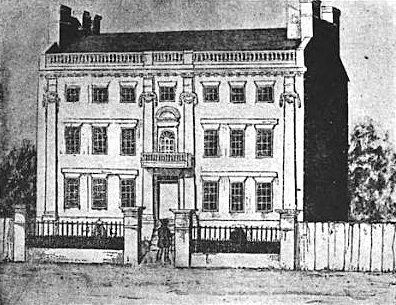Watching the Mob with Deacon Tudor
One of the most telling accounts of the mobbing of Lt. Gov. Thomas Hutchinson’s house on 26 Aug 1765 came from John Tudor (1709-1795), a merchant, marine insurance dealer, and deacon who lived nearby in the North End.
After that event, Tudor went back in his journal to fill in what he’d heard about recent house-mobbings, then got to what he saw himself:
After that event, Tudor went back in his journal to fill in what he’d heard about recent house-mobbings, then got to what he saw himself:
This brought it to the dusk of the evening, tho’ it was a moonlight Night near the full Moon. Then the Monsters being enflam’d with Rum & Wine which they got in sd [Benjamin] Hallowells Celler proceeded with Shouts to the Dwelling House of the Honl. Thos. Hutchinson Esqr. Lieut. Governor & The Mob enter’d in a Voyalant manner, broke the Wainscot, partitions, Glasses &c.; broke & distroy’d every Window, Broke, tore or carred off all the Famaly’s Apparel Jewels, Books &c. and Carred off about 900£ Sterling in Cash, they worked hard from 8 O’Clock on the House, Fences &c. till about 12 or one O’Clock; when they got on the top of the House and cut down a large Cupola, or Lanthron which took up their Time till near Daylight, leaving the House a mear Shell.Tudor appears to have been caught up in the excitement of the night of 26 August, then woke up the next day with regrets and worries about what might happen next. And that’s how a lot of Boston felt. Town leaders stepped in to tamp down violence for the rest of the year even as they continued to encourage resistance to the stamp tax. The destruction of Lt. Gov. Hutchinson’s house remained the high tide of sustained anti-Crown violence inside Boston until the actual war.
So great a piece of Cruilty (I believe) on so good, so inocent a Gentleman was never committed since the Creation. The next Day the Governor & Councle Issued out a proclamation of 300£ Lawful m’y to anyone who shold discover the Leador, or Leadors of the Mob and 100£ reward for the discovery of any Actors in the affare. T’was supposed that several Contrey Fellows & saylors was concerned in this Mob, as there was but few of them known. There was a number of Boys from 14 to sixteen Years of age, som mere Children which did a great deal of damage in breaking the Windows & distroying the Furniture Apparel &c.
But what is surprising there was some hundreds of people looking on as spectators, I was one, that had they known each others minds they mite have prevented the Mischief don at the Livt. Governor’s; But there was such a Universal obhorance of the Stamp Act which past in England & was soon to be put in execution in America and which was the cause of the Mob’s riseing and commiting such cruilty on the Governor; thinking he had som hand in the Stamp Act, but it was soon known that he was not only inocent, but had protested against it. . . .
The next Day there was a full town Meeting, when they Voted Vnanimously their utter detestation of the violent proceedings of the Mob &c. and had the minds of the people and the Inocence of Governor Hutchinson been known before, as it was at this meeting, the mischief at his house mite easily have been prevented, as the next day their was a Universal Lamentation for the Distruction don.


No comments:
Post a Comment